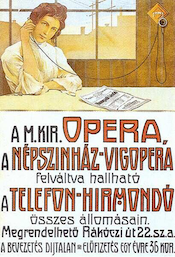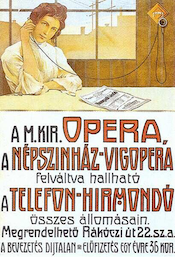
Mention anything about the history of opera and opera houses to Mark Schubin, as I was about the Budapest Operaház (column item above), and he will dig up something fascinating:
His name, in Hungarian, was Puskás Tivadar, sometimes translated into English as Theodore Bushgash. Like Count Dracula, he was descended from Transylvania nobility. Unlike Dracula, he has been credited with much of what you do every day, from saying "Hello" to making telephone calls. Some of that might be mere legend, but one of his creations is extremely well documented: the newscast. And he created it for opera.... The idea of delivering opera electronically to homes for a fee became reality in Lisbon in 1885 and then spread across Europe.
Puskás came up with the system in Budapest, but he added a twist. In the evening, the system could deliver operas, but the lines would otherwise be unused, which seemed a waste. So Puskás introduced the concept of a Telefon Hírmondó, a telephone herald, an electronic newspaper, or, to put it another way, the world's first station with a programming schedule.
Reporters gathered news, editors formatted it, and a "stentor" read it into microphones. During opera transmissions, the news waited for intermissions. The system was so successful that it lasted from 1893 into World War II, when bombing destroyed its lines (there were 27 lines from the Opera House alone), and radio made it impractical to repair them.

